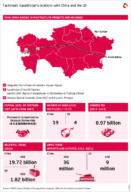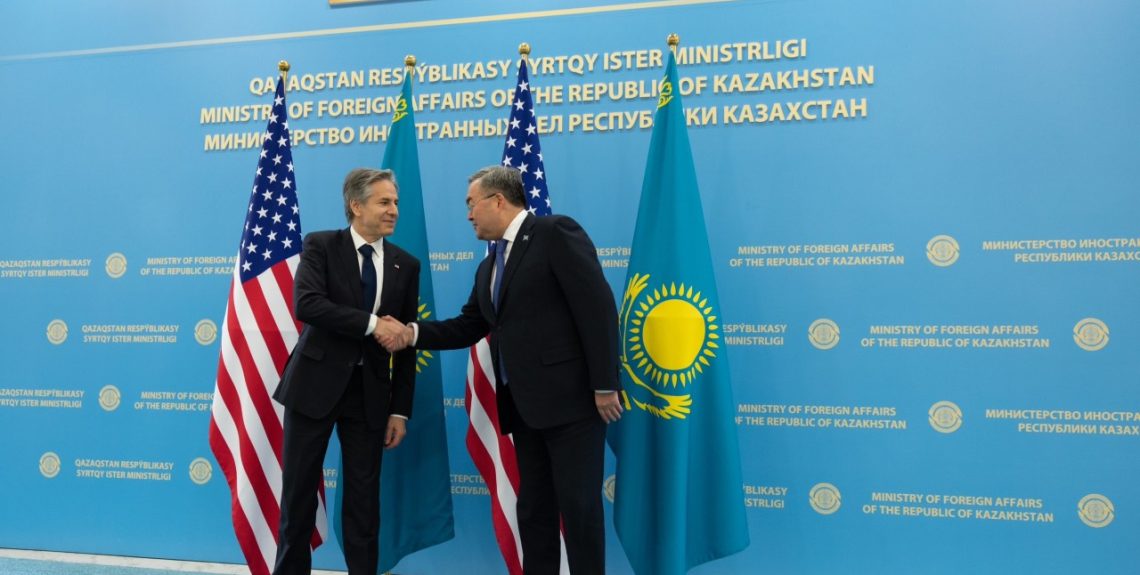A series of developments over the past few years have been redefining Central Asia’s security environment at a speed, scale and concurrency unseen since the collapse of the Soviet Union.
The region comprises Kyrgyzstan, Uzbekistan, Tajikistan, Turkmenistan, and Kazakhstan. However, the republics’ increased interaction with each other and culturally close Afghanistan, China’s Xinjiang, parts of Iran, Pakistan are re-drawing the region’s contours in its re-iteration.
 Challenges are numerous. Not only do border incidents flare up over territory, transit and water access, but the Taliban’s return to power, coupled with their inability to gain international recognition only augmented their reliance on narcotics trade as a source of income. That inadvertently chips away at the social and security fabric of neighbouring republics – located on a well-trodden smuggling route extending to Russia and Europe. Finally, the drying of the Aral Sea and the melting of glaciers threaten the region with water scarcity and could create a wave of environmental refugees.
Challenges are numerous. Not only do border incidents flare up over territory, transit and water access, but the Taliban’s return to power, coupled with their inability to gain international recognition only augmented their reliance on narcotics trade as a source of income. That inadvertently chips away at the social and security fabric of neighbouring republics – located on a well-trodden smuggling route extending to Russia and Europe. Finally, the drying of the Aral Sea and the melting of glaciers threaten the region with water scarcity and could create a wave of environmental refugees.
As the US seeks to maintain its global primacy and counter emerging threats, the strategic importance of Kazakhstan in the Central Asian region becomes increasingly evident.
The country is a linchpin in the vast Central Asian-Caspian Basin zone, a region rich in energy resources and a gateway for commerce and communications between Europe and Asia. Additionally, Russia’s aggression in Ukraine and the ever-present threat of militancy in Afghanistan provide sufficient reason to stay engaged in Central Asia.
To start with, the United States was the first country to recognize Kazakhstan’s independence in 1991 and has remained a stalwart partner. US-Kazakh cooperation in security and nuclear non-proliferation is a cornerstone of this relationship: the United States then assisted Kazakhstan in the removal of nuclear warheads, weapons-grade materials, and their supporting infrastructure. Almost simultaneously, NATO’s relations with Kazakhstan started in 1992, when the country joined the North Atlantic Cooperation Council. Practical cooperation began when Kazakhstan joined the Partnership for Peace programme in 1995.
Then came the 9/11 attacks, which turned out to be a watershed moment in US relations with Central Asia. As allied troops poured into Afghanistan, the US needed to secure its supply lines and Kazakhstan was forthcoming in offering use of its airspace. By 2010, a surge of US forces in Afghanistan coincided with a surge of military aid to Central Asia – a large chunk of it going to Kazakhstan. It was then that, with increased aid, Kazakhstan instituted many of its military reforms and received an Individual Partnership Action Plan from NATO.
Over the past decade, America’s military withdrawal from Afghanistan, Russia’s invasion of Ukraine and China flexing its muscles in the region have coalesced with already existing intra-regional dynamics, signalling a new era of geopolitics in Central Asia. But the perceived imperialist agendas of Russia and China, along with their geopolitical rivalries, have left Central Asian republics doubtful about the reliability of both as candid security partners. The USA, on the other hand, has no such political luggage. For that precise reason, it is vital that the US re-engages with the region and with Kazakhstan in particular.
First and foremost, the US needs to diplomatically assure Central Asian states that they are not limited to China’s loans or Russia’s military cooperation but that they can willingly cooperate with the United States as equal partners. But the US treating the region as one large cookie-cutter country obscures important differences and hinders an effective approach to the region. For example, US policymakers must recognize that while Turkmenistan is a closed and authoritarian country, Uzbekistan is booming and Kazakhstan is a regional power house in the making.
Revamping and upscaling diplomatic and defence ties with Kazakhstan will enable Washington to forge a closer relationship and ensure regional stability and cooperation. Cooperating with Almaty will also enhance intelligence sharing, counterterrorism efforts, and curb the spread of narcotics smuggling. Training programmes that professionalize Kazakhstan’s military can offer a cost-effective way for the United States to further a lasting partnership with Central Asia’s most stable country. These efforts must be nested within higher-level strategies and thoughtfully planned in coordination with the host nation.
Finally, as the world’s energy demands continue to rise (and Kazakhstan possesses vast reserves of oil and gas), ensuring the security and stability of energy supply routes becomes crucial. Kazakhstan can play a major role in lessening EU dependence on Russian energy. The US can focus on globalising these markets by increasing foreign investments and diversifying the region’s private sectors.
Since the collapse of the USSR (Union of Soviet Socialist Republics), the most important task of the United States has been to counter the reintegration processes in the post-Soviet space under Moscow’s leadership. Some detractors of US involvement in the region argue that Washington has already squandered millions without adding to regional security or furthering US goals in Central Asia. Moreover, the most recent National Security Strategy makes no reference to Kazakhstan and only mentions Central Asia in reference to safeguarding their natural resources. This is partly true.
Notwithstanding all said, the task of weakening Russia’s position in Central Asia has become even more acute following Russia’s invasion of Ukraine. Central Asian republics need to create regional security and cooperation mechanisms and institutions to advance their interests and shore up their security order shaped by external and internal drivers. The US needs a stable and secure Kazakhstan that has the ability to balance its role in the region. It is likewise important that Kazakhstan continues heading in the right direction vis-a-vis government reforms, but at a pace that is appropriate for the country and its citizens. The United States does not need a repeat of the ‘Arab Spring’ in Central Asia.
Russia’s ongoing war against Ukraine has alerted Central Asian leaders of the uncomfortable truth about how Putin really views the sovereignty, independence and territorial integrity of former Soviet republics. They have seen the Kremlin invade and hack off as much territory as it can get away with. Now, with a resurgent Taliban in power to the south, an increasingly assertive China to the east and a revanchist Russia to the north, Central Asia is more important than ever.
US President Joe Biden’s stated agenda of global engagement and long-term strategic planning requires a renewed focus on Central Asia. Russia’s full-scale invasion of Ukraine has forced Central Asian countries to seek opportunities to diversify their economies and reemphasize their independence from Moscow. However, while such fortunes may be in the process of shifting, Washington will need a more nuanced and targeted strategy to align these developments in its favour as part of its broader competition with Moscow and Beijing.
Embracing Kazakhstan as a vital ally is a step toward establishing a more interconnected, prosperous, and stable Eurasian region.
Harun Karčić
Journalist and political analyst covering the Balkans. Over the past decade, he has authored numerous articles on geopolitics and religion, particularly Islam, in the post-communist Balkans. He also writes about the role played by foreign powers including Saudi Arabia, Iran, and Turkey. His scope has more recently expanded to include China and Russia as well.






















